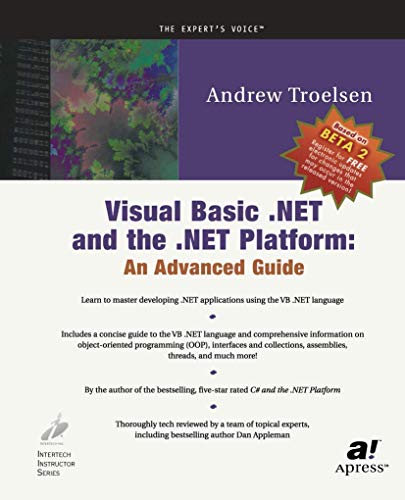visual basic net platform von troelsen andrew (6 Ergebnisse)
Suchfilter
Produktart
- Alle Product Types
- Bücher (6)
- Magazine & Zeitschriften (Keine weiteren Ergebnisse entsprechen dieser Verfeinerung)
- Comics (Keine weiteren Ergebnisse entsprechen dieser Verfeinerung)
- Noten (Keine weiteren Ergebnisse entsprechen dieser Verfeinerung)
- Kunst, Grafik & Poster (Keine weiteren Ergebnisse entsprechen dieser Verfeinerung)
- Fotografien (Keine weiteren Ergebnisse entsprechen dieser Verfeinerung)
- Karten (Keine weiteren Ergebnisse entsprechen dieser Verfeinerung)
- Manuskripte & Papierantiquitäten (Keine weiteren Ergebnisse entsprechen dieser Verfeinerung)
Zustand Mehr dazu
- Neu (3)
- Wie Neu, Sehr Gut oder Gut Bis Sehr Gut (Keine weiteren Ergebnisse entsprechen dieser Verfeinerung)
- Gut oder Befriedigend (3)
- Ausreichend oder Schlecht (Keine weiteren Ergebnisse entsprechen dieser Verfeinerung)
- Wie beschrieben (Keine weiteren Ergebnisse entsprechen dieser Verfeinerung)
Einband
- alle Einbände
- Hardcover (Keine weiteren Ergebnisse entsprechen dieser Verfeinerung)
- Softcover (6)
Weitere Eigenschaften
- Erstausgabe (Keine weiteren Ergebnisse entsprechen dieser Verfeinerung)
- Signiert (Keine weiteren Ergebnisse entsprechen dieser Verfeinerung)
- Schutzumschlag (Keine weiteren Ergebnisse entsprechen dieser Verfeinerung)
- Angebotsfoto (2)
Sprache (1)
Preis
- Beliebiger Preis
- Weniger als EUR 20 (Keine weiteren Ergebnisse entsprechen dieser Verfeinerung)
- EUR 20 bis EUR 45
- Mehr als EUR 45
Gratisversand
Land des Verkäufers
Verkäuferbewertung
-
Visual Basic .NET and the .NET Platform: An Advanced Guide
Sprache: Englisch
Verlag: SPRINGER/A PRESS (edition 1), 2001
ISBN 10: 1893115267 ISBN 13: 9781893115262
Anbieter: BooksRun, Philadelphia, PA, USA
Paperback. Zustand: Good. 1. It's a preowned item in good condition and includes all the pages. It may have some general signs of wear and tear, such as markings, highlighting, slight damage to the cover, minimal wear to the binding, etc., but they will not affect the overall reading experience.
-
EUR 30,14
EUR 7,46 shipping
Versand von Vereinigtes Königreich nach USAAnzahl: 1 verfügbar
In den WarenkorbZustand: New. pp. 1200.
-
Visual Basic.NET and the.NET Platform: An Advanced Guide (Intertech instructor series)
Anbieter: Sell Books, Elland, YORKS, Vereinigtes Königreich
EUR 24,00
EUR 13,94 shipping
Versand von Vereinigtes Königreich nach USAAnzahl: 1 verfügbar
In den Warenkorbpaperback. Zustand: Good. Our good condition books are generally good for reading but not for gifting or collecting. They could have imperfections such as creasing, fanning, inscriptions, margin notes, yellowing, staining on edge or cover or pages, bumps, scuffs, etc etc (sometimes multiple of these). It's a wide category that encompasses anything that isn't almost-new down to anything that is slightly better than poor. We would NOT recommend gifting Good books - these should be considered reading copies. Our books are dispatched from a Yorkshire former cotton mill. We list via barcode/ISBN so please note that the images are stock images and may not be the exact copy you receive, furthermore the details about edition and year might not be accurate as many publishers reuse the same ISBN for multiple editions and as we simply scan a barcode or enter an ISBN we do not check the validity of the edition data when listing. If you're looking for an exact edition please don't order (at least not without checking with us first, although we don't always have time to check). We aim to dispatch prompty, the service used will depend on order value and book size. We can ship to most countries, see our shipping policies. Payment is via Abe only.
-
Visual Basic.NET and the.NET Platform: An Advanced Guide (Intertech instructor series)
Anbieter: WeBuyBooks, Rossendale, LANCS, Vereinigtes Königreich
EUR 23,43
EUR 14,81 shipping
Versand von Vereinigtes Königreich nach USAAnzahl: 1 verfügbar
In den WarenkorbZustand: Very Good. Most items will be dispatched the same or the next working day. A copy that has been read, but is in excellent condition. Pages are intact and not marred by notes or highlighting. The spine remains undamaged.
-
Visual Basic .net And The .net Platform: An Advanced Guide
Anbieter: Romtrade Corp., STERLING HEIGHTS, MI, USA
Zustand: New. This is a Brand-new US Edition. This Item may be shipped from US or any other country as we have multiple locations worldwide.
-
Pro VB 2008 and the .NET 3.5 Platform, 2 Teile : Exploring the .NET universe with Visual Basic 2008
Anbieter: AHA-BUCH GmbH, Einbeck, Deutschland
Taschenbuch. Zustand: Neu. Neuware - The point of this chapter was to demystify the garbage collection process. As you have seen, the garbage collector will only run when it is unable to acquire the necessary memory from the m- aged heap (or when a given AppDomain unloads from memory). When a garbage collection does occur, you can rest assured that Microsoft's collection algorithm has been optimized by the use of object generations, secondary threads for the purpose of object finalization, and a managed heap dedicated to host large objects. This chapter also illustrated how to programmatically interact with the garbage collector using the System. GC class type. As mentioned, the only time when you will really need to do so is when you are building finalizable or disposable class types. Recall that finalizable types are classes that have overridden the virtual System. Object. Finalize() method to clean up unmanaged resources (at some time in the future). Disposable objects, on the other hand, are classes (or structures) that implement the IDisposable interface. Using this technique, you expose a public method to the object user that can be called to perform internal cleanup ASAP. Finally, you learned about an of- cial 'disposal' pattern that blends both approaches. PART 3 Advanced VB Programming Constructs CHAPTER 9 Working with Interface Types This chapter builds on your current understanding of object-oriented development by examining the topic of interface-based programming.




